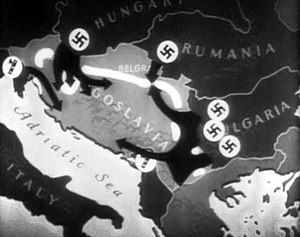Aufmarsch 25
| Invasion of Yugoslavia | |||||||
|---|---|---|---|---|---|---|---|
| Part of the Balkans Campaign of World War II | |||||||
 Illustration of the Axis invasion of Yugoslavia |
|||||||
|
|||||||
| Belligerents | |||||||
|
|
|||||||
| Commanders and leaders | |||||||
| Strength | |||||||
|
Germany: 337,096 875 tanks 990 aircraft Italy: 22 divisions 666 aircraft Hungary: 9 brigades 6 air squadrons |
700,000 (400,000 ill-prepared) 110–200 tanks (50–54 of which were modern) 460–505 aircraft (including 103 modern bombers and 107 modern fighter aircraft) |
||||||
| Casualties and losses | |||||||
|
Germany: 151 killed 392 wounded 15 missing 40 aircraft shot down Italy: 3,324 killed or wounded 10+ aircraft shot down, 22 damaged. Hungary: 120 killed 223 wounded 13 missing 7 aircraft shot down |
Thousands of civilians and soldiers killed 254,000–345,000 captured by Germans, 30,000 by Italians 49 aircraft shot down, 103 pilots and aircrew killed 210–300 aircraft captured 3 destroyers and 3 submarines captured |
||||||
Axis victory
The invasion of Yugoslavia, also known as the April War or Operation 25, was a German-led attack on the Kingdom of Yugoslavia by the Axis powers which began on 6 April 1941 during World War II. The order for the invasion was put forward in "Führer Directive No. 25", which Adolf Hitler issued on 27 March 1941, following the Yugoslav coup d'état.
The invasion commenced with an overwhelming air attack on Belgrade and facilities of the Royal Yugoslav Air Force (VVKJ) by the Luftwaffe (German Air Force) and attacks by German land forces from southwestern Bulgaria. These attacks were followed by German thrusts from Romania, Hungary and the Ostmark. Italian forces were limited to air and artillery attacks until 11 April, when the Italian army attacked towards Ljubljana (in modern-day Slovenia) and through Istria and Lika and down the Dalmatian coast. On the same day, Hungarian forces entered Yugoslav Bačka and Baranya, but like the Italians they faced practically no resistance. A Yugoslav attack into the northern parts of the Italian protectorate of Albania met with initial success, but was inconsequential due to the collapse of the rest of the Yugoslav forces.
...
Wikipedia
